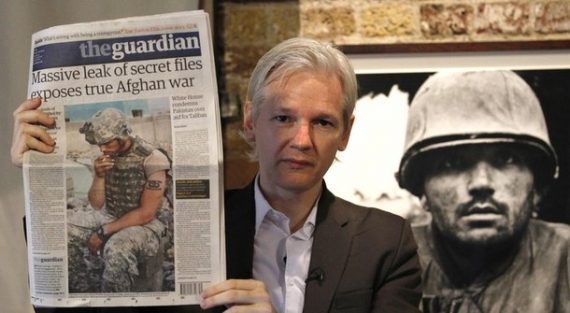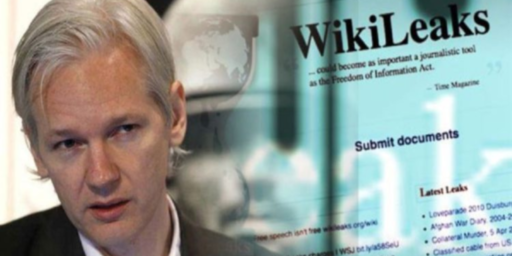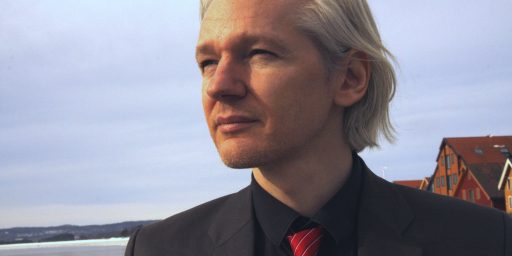Palin: Obama Administration’s Incompetence in the WikiLeaks Fiasco
Sarah Palin has taken to her Facebook page to raise "Serious Questions about the Obama Administration's Incompetence in the WikiLeaks Fiasco." They're more interesting than I'd expected.
Sarah Palin has taken to her Facebook page to issue a proclamation raising “Serious Questions about the Obama Administration’s Incompetence in the Wikileaks Fiasco.”
First and foremost, what steps were taken to stop Wikileaks director Julian Assange from distributing this highly sensitive classified material especially after he had already published material not once but twice in the previous months? Assange is not a “journalist,” any more than the “editor” of al Qaeda’s new English-language magazine Inspire is a “journalist.” He is an anti-American operative with blood on his hands. His past posting of classified documents revealed the identity of more than 100 Afghan sources to the Taliban. Why was he not pursued with the same urgency we pursue al Qaeda and Taliban leaders?
What if any diplomatic pressure was brought to bear on NATO, EU, and other allies to disrupt Wikileaks’ technical infrastructure? Did we use all the cyber tools at our disposal to permanently dismantle Wikileaks? Were individuals working for Wikileaks on these document leaks investigated? Shouldn’t they at least have had their financial assets frozen just as we do to individuals who provide material support for terrorist organizations?
Most importantly, serious questions must also be asked of the U.S. intelligence system. How was it possible that a 22-year-old Private First Class could get unrestricted access to so much highly sensitive information? And how was it possible that he could copy and distribute these files without anyone noticing that security was compromised?
The White House has now issued orders to federal departments and agencies asking them to take immediate steps to ensure that no more leaks like this happen again. It’s of course important that we do all we can to prevent similar massive document leaks in the future. But why did the White House not publish these orders after the first leak back in July? What explains this strange lack of urgency on their part?
These are actually more interesting questions than I expected when I saw the headline.
I had anticipated this one: “How was it possible that a 22-year-old Private First Class could get unrestricted access to so much highly sensitive information? And how was it possible that he could copy and distribute these files without anyone noticing that security was compromised?” Any my answer, outlined in a New Atlanticist piece titled “Plugging The WikiLeaks,” is that we over-corrected after 9/11, going from a system with too many stovepipes to one with too few. Under the Bush Administration. But I don’t blame Bush or Obama. Setting up security protocols is several steps below their paygrade, neither within their technical competence or span of control. Our intelligence community screwed this one up and has been slow to correct their mistakes.
But Palin actually has a point when she asks, “But why did the White House not publish these orders after the first leak back in July? What explains this strange lack of urgency on their part?” Crisis management after a disaster is indeed the president’s job. And the reaction has been too slow. (Although it’s quite probable that all of the theft happened at one time, in which case new protocols wouldn’t stop these dumps by Assange and company.) While Obama’s coolness and refusal to make knee jerk statements — or, indeed, statements at all — in the day or three after a crisis breaks has often served him well, this may well be a case where umpteen committee meetings over a span of months won’t do.
The questions asked in the first two paragraphs excerpted above, though, are far more fundamental. Essentially, she’s arguing that the United States is at war and WikiLeaks is a de facto enemy spy service and we should act accordingly. While my strong instinct is that Assange and company are non-combatants pushing the envelope on free speech, I’m not entirely sure Palin’s wrong. Certainly, her viewpoint has resonance with many.
The Pentagon Papers case and others seem to have established that journalistic entities may publish classified documents as part of their protection under the 1st Amendment. While publication of certain information may be actionable in court after the fact, there can be no prior restraint. The duty to protect classified information falls on the government and its agents.
That said, there’s growing sentiment that Assange has violated the Espionage Act. The salient legal distinction, I gather, is whether the publication is done with intent to harm the United States. The NYT and WaPo, publishers of the Pentagon Papers, clearly had no such aim. WikiLeaks, arguably, does. But it’s very hard to prosecute under the Espionage Act, for legal and practical reasons. And it’s particularly difficult in the present circumstance, where you have a foreign national hiding out in a country that has very little proclivity to extradite criminals to the United States and using servers all over the world to store and publish the information in question.
Regardless, the Espionage Act is a criminal statute. Assange would have to be arrested, charged, and convicted in a court of law. Palin seems to be implying — she stops short of asserting directly — that Assange should simply be hunted down and shot. And she does seem to be advocating conducting cyber war against his servers. She’s right that we wouldn’t hesitate to do that in the case of an al Qaeda website that was publishing damaging information. But, while I find his actions reprehensible, Assange isn’t a terrorist. Nor is there any evidence that he “has blood on his hands.” Granted, that’s a happy accident in that he seems blissfully uncaring about the consequences of his actions.




Statistically, whenever Sarah Palin is talking about the 1st Amendment, it’s very likely that she is wrong.
Don’t bust him before he dumps those bank documents. (Although, and here my cynicism shows itself, that threatened dump will probably be more galvanizing than anything he’s done heretofore.)
@sam:
If it’s information on private accounts, there’s no doubt it will be more galvanizing. So far, most people think these dumps have revealed “nothing we didn’t know.”
I don’t really understand this obsession with shooting the messenger. Shut down Wikileaks and within hours another site is up and running. Once the information is out in the open on the internet, it is out for eternity.
The plug needs to happen inside the government. Examples need to be made of Manning but also of some White House or Congressional leaker. And of course, how do you undo the heroic story the Left loves to tell of the Pentagon Papers. How one man undid the war and the presidency by revealing the true thoughts of government planners.
In the end, this isn’t high level stuff or someone needs to be frogmarched to jail for letting it onto a network with recordable devices attached to it. But the horror in Washington isn’t what is being revealed but that so much of the cocktail circuit’s currency has been devalued. When your importance is dependent on what petty secrets you know, it does you no good to have some “blog” blabbing them all over the internet.
Here’s Assange on the bank dump, sounds juicy (from, Forbes, An Interview With WikiLeaks’ Julian Assange):
Can’t say I think much of this definitely not-wysiwyg commenting system. What I saw was perfectly formatted.
It strikes me that Assange might have more on banks targeting weak borrowers, and building mortgage backed bonds that they know cannot be repaid. But that’s pretty much out already. It’s the reason we are seeing settlements:
“Last month, former Countrywide chief executive Angelo Mozilo agreed to settle insider trading and other charges brought by the SEC for $67.5 million. About $22.5 million of that amount is being paid by Mozilo; the rest is being covered by Bank of America, which acquired Countrywide.”
Kind of a good settlement from Mozilo’s staindpoint … with poor old BoA chipping in.
(on editors, this one does seem flaky, and in particular it is not iphone compatible.)
BTW, I suppose it’s a long shot that the government wants these particular docs out?
There seems to be a lot of smooth transitioning going on.
Here, the State Department gets a good review, in the leaks:
http://www.guardian.co.uk/commentisfree/2010/nov/28/wikileaks-diplomacy-us-media-war
So, just to pop back to the subject at hand here, what Palin is saying may be more “interesting” than expected, but it does betray exactly what she believes — that because the US is always right and always good, we have the right — and in fact, the obligation — to violate any international law to hunt down and disrupt Wikileaks, even to murder Assange because what he’s doing inconveniences us.
And no doubt she’ll claim this is in the constitution. Complete ignorance, absolute arrogoance, combined with an overwhelming sense of victimization. The only reason she’s not a monster is because she is powerless.
The Espionage Act is an American law, or international one? If American, in what way does our jurisdiction cover Assange? He’s not American and he’s not in America.
“So far, most people think these dumps have revealed “nothing we didn’t know.””
If that’s really the case, why are all the crazy right-wingers so upset?
Assenge and His leakee should be arrested and tried on charges of espionage and treason. These “freedom of information” leaks aren’t that at all. They are quite simply some anti american dope trying to make a name for himself. Of course with Eric Holder as our illustrious A.G. there will be no prosecutions or charges (see the Black Panther voter intimidation issue). And given their track record with true terrorists, they may as well forget a conviction. BUT the charges should still be brought.
One also wonders if Assenge has “insurance,” and what it might be.
Assenge isn’t an American citizen, so he’s not a traitor. He’s not working for a foreign government, so he’s not a spy.
What he IS doing is letting taxpayers know what their government is doing in their name. What mystifies me is how many people wish to remain in the dark about that.
The salient legal distinction, I gather, is whether the publication is done with intent to harm the United States. The NYT and WaPo, publishers of the Pentagon Papers, clearly had no such aim. WikiLeaks, arguably, does.
I’d bet a good sum of money that some right-winger would argue that the NYT and WaPo had the aim of harming the United States. Luckily, real treason has a much higher threshold.
Oops, meant to quote JJ above.
“The salient legal distinction, I gather, is whether the publication is done with intent to harm the United States.”
Well, Duh! You think Assange had the best interests of the United States at heart when he did this? Do you honestly believe the NYT (with it’s history of releasing classified information) acted on behalf of US interests? What color is the sky in your world?
I think a lot of what Palin says here is obvious to just about everyone at this point. I also think that sometimes we overlook the sheer inertia of these huge bureaucracies and their inability to respond to any change in a timely fashion.
It kind of reminds me of FEMA and Katrina with the nasty little Assange playing the part of Katrina. We should have seen this coming and been ready for it.
I hear he is threatening to reveal secrets about Russia and China as well. Now, if this guy manages to get secrets from those countries as well as the US, I am going to start to wonder who he is actually working for.
Alex:
Actually Assange is selectively leaking material with the intent of doing harm to people who have done him no harm. The thing that amazes me is how many liberals who had a cow about the socalled outing of Plame could give a rat’s behind about the outing of all sorts of people all over the world.
I don’t think Assange is doing some public service, what he is aiming for is chaos. Good old fashioned chaos. No governments, not today’s governments or the ancients always laid all their cards on the table. It has never been that way and it never will be…and people often times say things in private they would not say in public..that is not about dishonesty it is about privacy.
Terrye, the straw men are “secrets are good” and “secrets are bad.” Take your pick. Both are wrong part of the time.
I think Wikileak’s shotgunning of mass secrets is definitely bad, I’m not going to buy into the idea that government always knows best. If the CIA spiked some town’s water with LSD, we should know.
john:
I am not saying that the government always knows best, but what we have hear is the mass leaking of private correspondence and communications done by people who were under the impression that what they were saying would remain private.
If some misguided liberals or libertarians want to invoke the name of James Madison or whoever to justify this sort of behavior they can, but the truth is that even the founding fathers had their secrets and that not everyone in the Colonies was expected to know everything every representative everywhere said or did. It is just silly.
Hey Julian and wikileaks, your effort is useless and dangerous to world peace. It simply has not served any purpose or whatsoever that you posted it in the first place. I am sure you no longer find happiness knowing how stupid your action is. I’d care more about scientists making discoveries to better our society not this nonsense.